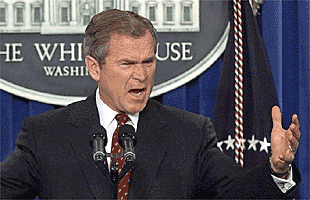Washington’s Nuclear Policy: Moral Clarity or Double Standards
Article was so far featured in Aljazeerah (Middle East; January 06. 2003) and Foreign Policy in Focus (January 08, 2002), Counterpunch (Jan. 10, 2003), Nagasaki Post (Japan; January 12, 2003), The Daily Times (Pakistan; January 14, 2003), The Globalist (January 16, 2003), Scoop (New Zealand; Jan. 06. 2003), and Dawn International (Pakistan; January 18, 2003).
Have you ever seen an alcoholic preaching abstinence and advocating prohibition?

Just listen to President George W. Bush lecturing the world on the threat from Iraq and North Korea and on the virtues of nuclear non-proliferation. He is the commander-in-chief of a military force that not only possesses and maintains nearly 10,000 nuclear weapons but also boasts an array of weapons of mass destruction, including chemical and biological arsenals. The American position on nuclear weapons is rife with hypocrisy and layered with double standards.
The U.S. is the number one proliferator of weapons in terms of marketing. Even in regions such as the Middle East where peace is deemed crucial to American interests, America is the top exporter of advanced weapons including strategic fighters (such as F-16s) and missiles to both sides–Israel and Arabs. The U.S. sold nearly $13.9 billion in weaponry to governments, and licensed nearly $30 billion in commercial sales in 2001. If the next Arab-Israeli war involves vastly more sophisticated and dangerous weapons than ever before, we will have only the U.S. to thank for it.
The U.S. was not only the first to produce nuclear weapons, but to date remains the only nation in the world to have used nuclear weapons, more than once. Even now, long after the end of the cold war, it continues to possess chemical and biological weapons and has just announced a massive new missile system that will enhance its global military domination–in turn facilitating an enhanced unilateralist posture. It will also ensure a new arms race by triggering a security dilemmaa for other nations wary of Washington’s neo-imperial agenda.
Washington continues to maintain close relations with such nations as India, Pakistan, and Israel that have refused to sign the nuclear nonproliferation treaty and are widely known to possess significant nuclear arsenals. Israel is reputed to have anywhere between 50-200 illegal nukes. Yet the Bush administration is determined to intimidate and punish nations that evidently do not have nuclear weapons but only nuclear ambitions, such as Iran and Iraq. The nuclear ambitions of these two nations are not unlike those that spurred India, Israel, and Pakistan to develop their own nukes.
To this day the U.S. has never expressed any concern over the illegal nuclear and other weapons of mass destruction that Israel possesses. Now in the post-9/11 climate, Washington has decided that its own interests are best served by ignoring the fact that India and Pakistan also continue to defy not only the nuclear non-proliferation regime but also the nuclear test ban regime.
According to Washington, Iraq and Iran nurse an unquenchable thirst for nuclear weapons. American propagandists have also argued that these nations desire these weapons of mass destruction for the explicit purpose of using them against the U.S. and its allies (read Israel). Unless it can be demonstrated that both Iran and Iraq have a very strong desire to self-destruct it is difficult to understand why any nation would be willing to sign its own death warrant by attacking the United States. The world has not forgotten what happened to Hiroshima and Nagasaki. Children born in those cities still bear signs of the U.S. nuclear attacks.
In his first State of the Union address, President Bush made his intentions clear about the “axis of evil”–Iran, Iraq, and North Korea. He was determined to eliminate their capacity to threaten America or its allies. But now we havve a strange situation. Iraq denies that it has any weapons of mass destruction and so far after over 200 inspections the UN inspectors have discovered nothing. The U.S. claims it has certain knowledge of Iraq’s evil weapons and even after sharing its “intelligence” with the inspectors, nothing has been discovered. In contrast, North Korea has not only declared that it has an active nuclear weapons program but is determined to become a nuclear power in the immediate future. But the U.S. is targeting Iraq for a massive military attack while ruling out any military option against North Korea
On many levels, America’s current war plans raise questions about its moral clarity. Washington articulates policy in idealistic terms but applies it in realistic fashion. If the objective is to limit the proliferation of nuclear weapons, then the U.S. must continue to pressure those who already have them (India, Pakistan, and Israel) and those who are about to have them (North Korea) just as much if not more than those who aspire to them (Iraq and Iran).
And if nuclear weapons are indeed seen as a danger to world peace, then Washington should work to denuclearize South Asia and the Middle East by persuading India, Pakistan, and Israel to voluntarily denuclearize (like Sweden, South Africa, Argentina, and Brazil) and submit to inspection regimes. At the same time, the U.S. should also give the world a firm timetable on its own denuclearization program (in concert with UK, France, Russia, and China) and immediately cease all further development and production of all weapons of mass destruction.
If these measures are impossible for reasons of realpolitik, then President Bush should at lest spare us the tedious rhetoric about U.S. “moral clarity” and the battle between good and evil, and let his actions and policies speak for themselves.








